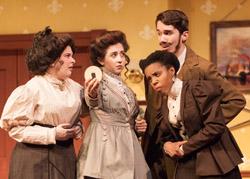
In addition to General Theatre, the theatre major offers options in Acting & Directing, Dance, Design & Theatre Technology, Musical Theatre and Secondary Theatre Education.
Performance opportunities include five main stage faculty-directed productions, two touring productions, and more than 20 student-directed productions including plays, musical theatre, dance, and puppetry. The curriculum allows for flexibility to independently study a broad range of interests. Financial assistance provides access to internship opportunities with professional theatre or dance organizations, and our January Term study abroad program immerses students in London theatre as well as gaining insights into politics and societal issues.
Any incoming student with prior experience in theatre or dance should speak with an adviser in order to be placed in the correct class level.
General Requirements
The general theatre major allows students to explore a variety of areas. In the freshman and sophomore years, the student should enroll in at least two theatre and two general education courses per semester. The minimum grade requirement for Dance Option and Secondary Education courses is B-. For all other emphasis areas, the minimum grade requirement is C-. Any grade lower than the minimums stated above will not count toward the major. Under department policy, students who complete two semesters of American Sign Language satisfy the liberal arts language competency requirement. All majors must take courses in the following areas: Performance, Design/Theatre Technology, and Theory/History as well as complete a practicum course every semester and complete a capstone course. Although timing will vary with each emphasis, it is strongly suggested that all introductory courses be taken prior to the end of the student's sophomore year. Major department courses may not be used to satisfy discovery category requirements except in the case of a second or dual major.
Theater Practicum
The theatre and dance major practicum has been developed to assure a breadth of experience in the major. Students are required to take at least one practicum for every semester they are a major in the Theatre and Dance Department. All practicum credits must be earned for work done at UNH and supervised by the Theatre and Dance Department. Approximately 35 work hours are required per practicum class. Each practicum course is graded pass or fail. The student must meet with the practicum instructor no later than the second week of the semester for job description, procedures, and assignments. Failure to do so may result in receiving an “F” for the course.
AUDITIONS ARE REQUIRED FOR THE ACTING, MUSICAL THEATRE AND DANCE OPTIONS. FOR ALL OTHER OPTIONS, INTERVIEWS ARE STRONGLY ENCOURAGED.